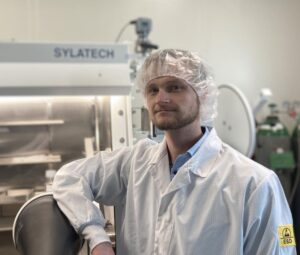Concept for rational design of important nitrogen compounds

Felix Leowsky-Künstler, M.Sc.
Photo: UBT / Chr. Wißler
N-Heterocyclic compounds are central active ingredients of many drugs and at the same time important building blocks of new organic materials for the energy transition.
Researchers at the University of Bayreuth, led by Prof. Dr. Rhett Kempe, now present in “Nature Communications” a concept for the rational design of new classes of substances belonging to the group of N-heterocyclic compounds. At the same time, they present two new classes of substances synthesized on the basis of this concept. Today, innovations in fields of medical agents or functional materials rely substantially on the discovery of new classes of substances.
N-Heterocycles are organic compounds whose ring-shaped structures contain at least one nitrogen atom in addition to carbon atoms. So far known classes of substances belonging to the group of N-heterocyclic compounds are already scientifically well developed in terms of their bio-activity and their diverse applications. As a result, they are hardly considered to have any strong future-oriented innovation potential, for example in pharmaceuticals.
“For chemistry to continue to fulfill its pioneering role in drug development, it will be less important to provide new examples of known substance classes. Rather, the discovery of new classes of substances will be crucial. However, this is very difficult and still tends to succeed by chance. Concepts for the rational design of new substance classes – that is, for a targeted design of molecular compounds based on chemical knowledge – are practically non-existent. Against this background, the concept we have developed for the rational design of N-heterocyclic substance classes is a promising way to develop new drugs and new functional materials”, says Prof. Dr. Rhett Kempe, who holds the Chair of Inorganic Chemistry II – Catalyst Design at the University of Bayreuth.
Young Bayreuth scientists give names to new classes of substances

Photo: private
The Bayreuth research team has used the new concept to introduce two new N-heterocyclic substance classes: the fertigines, named after the study’s first author Robin Fertig, and the kunstlerines, named after the second author Felix Leowsky-Künstler. Both young scientists are currently pursuing their doctorates at the University of Bayreuth. “Expanding the group of N-heterocyclic compounds by rational design to include new, previously unknown classes of substances was a fascinating undertaking. In the process, we have seen that chemistry is, at its core, a very creative science”, says Robin Fertig. “The concept now opens up new possibilities for the synthesis of chemical compounds that were previously difficult or impossible to access”, adds Felix Leowsky-Künstler.
Wissenschaftliche Ansprechpartner:
Prof. Dr. Rhett Kempe
Sustainable Chemistry Centre
University of Bayreuth
Phone: +49 (0)921 55-2540
E-mail: kempe@uni-bayreuth.de
WWW: https://www.sustainable-chemistry-centre.uni-bayreuth.de/en/
Originalpublikation:
Robin Fertig, Felix Leowsky-Künstler, Torsten Irrgang, Rhett Kempe: Rational design of N-heterocyclic compound classes via regenerative cyclization of diamines. Nature Communications (2023), DOI: https://doi.org/10.1038/s41467-023-36220-w
Media Contact
All latest news from the category: Life Sciences and Chemistry
Articles and reports from the Life Sciences and chemistry area deal with applied and basic research into modern biology, chemistry and human medicine.
Valuable information can be found on a range of life sciences fields including bacteriology, biochemistry, bionics, bioinformatics, biophysics, biotechnology, genetics, geobotany, human biology, marine biology, microbiology, molecular biology, cellular biology, zoology, bioinorganic chemistry, microchemistry and environmental chemistry.
Newest articles

Innovative 3D printed scaffolds offer new hope for bone healing
Researchers at the Institute for Bioengineering of Catalonia have developed novel 3D printed PLA-CaP scaffolds that promote blood vessel formation, ensuring better healing and regeneration of bone tissue. Bone is…

The surprising role of gut infection in Alzheimer’s disease
ASU- and Banner Alzheimer’s Institute-led study implicates link between a common virus and the disease, which travels from the gut to the brain and may be a target for antiviral…

Molecular gardening: New enzymes discovered for protein modification pruning
How deubiquitinases USP53 and USP54 cleave long polyubiquitin chains and how the former is linked to liver disease in children. Deubiquitinases (DUBs) are enzymes used by cells to trim protein…



